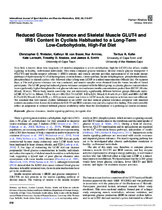| dc.contributor.author | Webster, Christopher C | |
| dc.contributor.author | van Boom, Kathryn Merle | |
| dc.contributor.author | Armin, Nur | |
| dc.date.accessioned | 2020-11-11T08:03:25Z | |
| dc.date.available | 2020-11-11T08:03:25Z | |
| dc.date.issued | 2020 | |
| dc.identifier.citation | Webster, C. C. et al. (2020). Reduced glucose tolerance and skeletal muscle GLUT4 and IRS1 content in cyclists habituated to a long-term low-carbohydrate, high-fat diet. International Journal of Sport Nutrition and Exercise Metabolism ,30(3), 210-217 | en_US |
| dc.identifier.issn | 1543-2742 | |
| dc.identifier.uri | http://hdl.handle.net/10566/5420 | |
| dc.identifier.uri | 10.1123/ijsnem.2019-0359 | |
| dc.description.abstract | Very little is known about how long-term (>6 months) adaptation to a low-carbohydrate, high-fat (LCHF) diet affects insulin
signaling in healthy, well-trained individuals. This study compared glucose tolerance; skeletal muscle glucose transporter 4
(GLUT4) and insulin receptor substrate 1 (IRS1) content; and muscle enzyme activities representative of the main energy
pathways (3-hydroxyacetyl-CoA dehydrogenase, creatine kinase, citrate synthase, lactate dehydrogenase, phosphofructokinase,
phosphorylase) in trained cyclists who followed either a long-term LCHF or a mixed-macronutrient (Mixed) diet. On separate
days, a 2-hr oral glucose tolerance test was conducted, and muscle samples were obtained from the vastus lateralis of fasted
participants. | en_US |
| dc.language.iso | en | en_US |
| dc.publisher | Human Kinetics Publishers Inc. | en_US |
| dc.subject | Glucose clearance | en_US |
| dc.subject | Insulin signaling pathway | en_US |
| dc.subject | Ketogenic diet | en_US |
| dc.subject | Skeletal Muscle | en_US |
| dc.subject | Diet | en_US |
| dc.title | Reduced glucose tolerance and skeletal muscle GLUT4 and IRS1 content in cyclists habituated to a long-term low-carbohydrate, high-fat diet | en_US |
| dc.type | Article | en_US |

